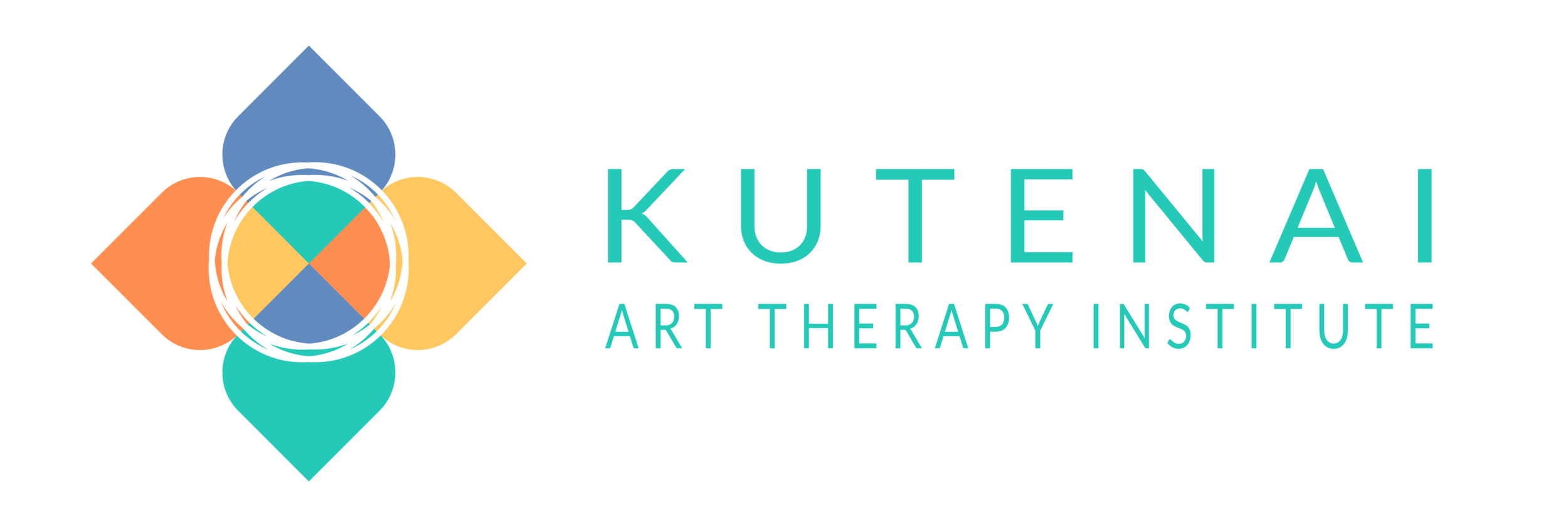Our post-baccalaureate diploma program is a comprehensive and immersive two-year training in art therapy.
Kutenai Art Therapy Institute (KATI) offers our program in two hybrid learning formats—campus hybrid and online hybrid. Both formats weave together transformative education and personal integration to cultivate spaces of collective care, learning, and support.
Program description
The KATI diploma program takes a trauma-informed relational approach to education, aiming to create an environment in which the diversity of each person’s story, gifts, and culture are welcomed and honoured. Students develop foundational art therapy skills grounded in contemporary theory, with ecological awareness, and an understanding of relationship as the core of therapeutic practice.
A recent survey of our alumni revealed that nine out of every ten of our students referred to their time at KATI as “transformational”. This reflects the power of transformative education—we increase our capacity, not simply by acquiring new skills, but by undergoing a fundamental change through the experience of learning.
We offer this program because, in the face of a rapidly changing world, we need creativity and emergent theories and practices to meet our evolving needs and collective responsibilities. We proactively endeavour to dismantle oppressive conditions of injustice and colonialism to create an educational environment that respects and welcomes all voices. We believe that engagement in art making and co-creating community spaces support the kind of healing and responsiveness that we need at this time.
Land-based art therapy
At KATI, we practice a relational, land-based approach to art therapy. This requires cultivating deep connection with each other, ourselves, our art, and the sentient, natural world. Influenced by Indigenous worldviews, we see "land" as the earth, water, air, and all beings within these ecosystems. This land-based approach extends awareness to these larger ecological systems, recognizing them as sources of both suffering and healing.
Land-based art therapy inspires hope and builds emotional resilience, essential for individual and collective healing amidst environmental crises. Students are encouraged to forge personal connections with nature and engage creatively with the natural world, viewed as a living entity deserving respect. This process involves deepening one’s understanding of land relationships, reflecting on personal beliefs, and shaping one’s ecological identity. The program also focuses on the ecological implications of therapeutic practices, including material choices and using art to enhance ecological consciousness.
Acknowledging the roots of land-based healing in Indigenous worldviews, KATI commits to transcending ethnocentric art therapy practices. Our goal is to train art therapists who are well-versed in environmental education theories and skilled in culturally respectful land-based healing practices, ready to make a meaningful impact in their professional field.
Program structure
The KATI program is structured as a cohort model, where each course builds on prior learning and compliments concurrent coursework. This journey fosters group cohesion, a rich sense of community, and abundant opportunities for lateral learning.
We endeavor to balance and integrate theoretical knowledge with experiential learning, supporting deep understanding and skill building through both practice and personal experience.
Two hybrid delivery formats
Hearthstone
Campus Hybrid
The Hearthstone format prioritizes in-person learning in an immersive, cohort experience in which at least 85% of the coursework is on-site.
This campus hybrid model includes established clinical and community-based placements, enriching opportunities for face-to-face networking and community building. Located in downtown Nelson BC, surrounded by the majestic West Arm of Kootenay Lake and the Purcell Mountains, our campus hybrid program invites students to a unique land-based approach to art therapy education. This setting naturally integrates the natural environment into every aspect of learning, both theoretical and practical, while also cultivating an awareness of the therapeutic needs inherent in rural communities and the ethical considerations unique to small community practice.
Rhizome
Online Hybrid
The Rhizome format emphasizes flexibility with at least 90% of the coursework occurring online—including online sessions and theory courses with clinical placements in students' home communities—culminating in an annual in-person Immersion in Nelson each May.
This online hybrid model is ideal for students with established personal and professional ties in their communities, aspiring to practice art therapy professionally in these settings. Despite geographical differences, this format strongly emphasizes lateral learning and connection, fostering collaborative coursework and co-facilitation of online art therapy groups. Integral to this format is the integration of land-based healing and ecological identity throughout the year, highlighted in the May immersion.
Our academic year begins in September and concludes in May. Students enjoy a summer break, a two-week winter holiday, and a spring reading break. Students should anticipate dedicating approximately 14 hours weekly to homework.
For both campus hybrid and online hybrid students, the academic year culminates in two weeks of on-campus experiential coursework and group activities. These two-week periods—which we refer to as Immersions—provide invaluable opportunities for embodied learning, community building, and hands-on art therapy practice.
Four types of coursework
The KATI diploma program is comprised of four core elements:
Theoretical coursework is structured to foster an understanding of a diverse range of psychological and art psychotherapeutic theories and research methodologies. This includes explorations into social and cultural theories, personal, collective, and historical trauma through neuroscience and colonialism lenses, and Indigenous relational and land-based healing approaches. Students engage with various theoretical approaches such as relational, land-based, phenomenological, existential, humanistic, Gestalt, feminist, anti-oppressive, cognitively-oriented, and positive art therapy, including approaches that intertwine spirituality and social justice.
Clinical coursework encompasses clinical placements and supervision to cultivate professional competencies. Extensive supervised clinical and community-based practice enables the student to integrate theory and clinical skills throughout the program. Students are required to complete 700 hours of clinical placement, including a minimum of 300 direct client contact hours, focusing on training culturally responsive art therapists.
Experiential coursework involves hands-on learning to support skills, practice, and integration of theory through arts-based and self-reflective activities. Art therapy training groups provide an opportunity to personally practice and experience the art therapy process. Experiential courses provide opportunities for students to engage in creative explorations and practice clinical and therapeutic skills through dyad and triad work.
Research begins with coursework which introduces students to a range of qualitative research methods applicable to art therapy. These courses prepare students to develop, propose and implement a thesis or capstone project showcasing their integrated theoretical, clinical, and therapeutic skills.
Our comprehensive and immersive program merges transformative education and personal integration, preparing students for empathetic, culturally responsive art therapy practice. Embark on this transformative journey and take the first step towards becoming an impactful art therapist equipped to serve a wide range of communities. Connect with us to learn more and join our next cohort.
Meet the faculty
Learn more
-
• Practice competently as a professional art therapist with adherence to the Canadian Art Therapy Association Standards of Practice.
• Practice trauma-informed and culturally safe art therapy skills with compassion.
• Demonstrate a commitment to personal and collective wellness through engagement in creative arts modalities.
• Demonstrate effective communication skills in establishing and maintaining therapeutic and professional relationships.
• Develop, facilitate, and critically evaluate therapeutic interventions and processes that are theoretically grounded, person-specific, and context-specific.
• Critically analyze psychological, counselling, relational, art therapy and social justice theories of change.
• Demonstrate competency in a range of integrative art therapy approaches that engage the mind, body, and spirit in relational, holistic, and embodied change processes.
• Critically evaluate and apply reflexive research methodologies relevant to contemporary art therapy theory and practice.
• Practice self-awareness and cultural humility to build community resilience with dignity and creativity while addressing emergent socio-cultural and ecological challenges.
-
A list of frequently referenced KATI policies related to the art therapy training program can be found below.
Policy A3 - Diversity and Anti-Racism
Policy C5 - Proficiency in English & International Student Requirements
Policy C9 - Tuition Refunds
Policy E4 - Dispute Resolution
Policy J7 - Sexual Misconduct and Harassment -
Kutenai Art Therapy Institute is certified with the Private Training Institutions Branch (PTIB) of the British Columbia Ministry of Advanced Education and Skills Training.
Before you enrol at a certified private training institution, you should be aware of your rights and responsibilities.
-
Students are expected to complete their course work in two years. Students have the option of taking additional time to complete placement hours and thesis or capstone project requirements for an additional fee.
Completion of clinical placement and supervision hours is dependent on meeting core competencies identified on the Supervision evaluation forms. Interns are expected to meet the required skills and expectations prior to graduation.
Students are awarded a diploma upon successful completion of all program requirements, including a thesis or capstone project. Visit our Research page to see previous thesis and capstone projects completed by KATI students.
Graduates are eligible (and encouraged) to apply as professional members of the Canadian Art Therapy Association and/or a provincial/regional art therapy association depending on where the graduate chooses to work.
What’s next?
Interested but not sure what’s next? Consider attending one of our online info sesions, read about our admissions process, or reach out and contact us directly.












